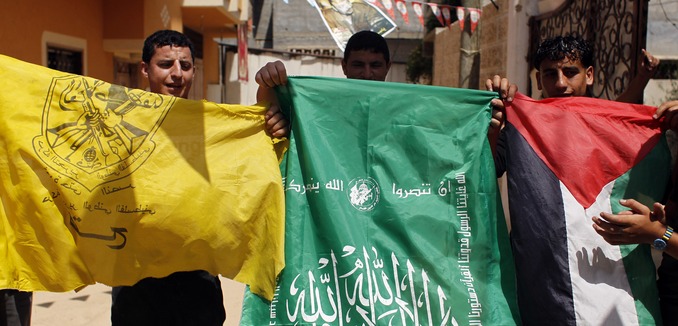None of the issues that last year’s Fatah-Hamas reconciliation agreement were supposed to address have been solved, according to a policy brief written yesterday by Grant Rumley, a research analyst for the Foundation of Defense of Democracies. The decision of Palestinian Authority President Mahmoud Abbas to join a unity government with the Gaza-based terror group Hamas was one of several actions he took that undermined the American-sponsored peace talks with Israel last year.
The surprise reconciliation announcement effectively ended the peace talks that Washington had mediated for nine months with little progress. Having run out of diplomatic patience, Palestinian officials stated their new goals were to focus on ending the division between the two parties, holding new presidential and parliamentary elections, and resolving the crisis of unpaid civil servants in Gaza. To date, none of these goals have been accomplished.
The election issue is a sensitive one for Fatah. The last parliamentary elections, in 2006, brought Hamas’s unexpected victory, which set the stage for the next year’s brief Palestinian civil war, during which Hamas overran the Gaza Strip. Hamas still believes it is the rightful ruler of the Palestinians after the 2006 vote. The Islamist faction was recently heartened by its surprise victory in student elections at Birzeit University – a prominent West Bank institution long considered a Fatah stronghold – suggesting that Hamas could win another national election. But polls in Gaza routinely show Fatah and Hamas as neck and neck. For now, both sides seem content with merely demanding elections in the near future and then blaming the other side when those elections fail to happen.
The issue of civil servants in Gaza remains a major problem, too. After the 2007 split, the Fatah-led [Palestinian Authority, or PA,] ordered its civil servants in the Strip to stay home in an attempt to hamper the Hamas-run government. In response, Hamas hired its own cadre of civil servants to fill the gap. However, Hamas has had trouble making payroll. The region’s upheavals have strained Hamas’s relationship with its financial patrons, notably Iran. Indeed, one of Hamas’s motivations for signing the reconciliation agreement last year was to lighten the financial load of paying those employees’ salaries. With the PA refusing to ease the burden, Hamas employees continue to experience long droughts without pay.
Squabbling between Fatah and Hamas has led to delays in rebuilding Gaza, leading Israel to take a lead role in the rebuilding process. The unity agreement with Hamas made the Fatah-led Palestinian Authority liable for violating numerous international laws, including banning the indiscriminate firing of rockets at civilians and the recruitment of child soldiers.
In What Will Happen If the Palestinians Really End Security Cooperation?, which was published in the April 2015 issue of The Tower Magazine, Neri Zilber pointed out that while security cooperation between Israel and the PA benefits Israel, it benefits the PA as well.
The various organs which make up the PA’s nascent (and U.S.-trained) security forces, including Preventive Security, are responsible for areas of the West Bank under full Palestinian control. They have numerous responsibilities: Upholding law and order, crime prevention, intelligence-gathering, counter-terror, and riot control, among others. But for many Palestinians, the one thing that receives the most attention is the PA security forces’ coordination with Israel. Average Palestinians often condemn the security forces as “subcontractors” for the Israeli occupation. In turn, Israeli officials are well aware of the tightrope that the PA needs to walk in order to maintain the security relationship while protecting its own legitimacy, and rarely discuss the issue in detail. ..
Because of this, I expected the senior official to politely decline a response when I raised the topic. Instead, he spoke openly about the longstanding security relationship between Israel and the PA “that continues and is ongoing.” He added, even more candidly, “From a security perspective there is not much difference of opinion with the Israelis.…We share the same interests.” Operationally, he said, coordination between Israel and the PA hinges on “daily and weekly contacts, and meetings on all levels”—from lieutenants in the field to service chiefs like him—regarding “security hazards and changes which threaten the stable security situation on both sides.”
These shared interests and security hazards entail many things, but none are as important as the threat of a Hamas takeover of the West Bank. “Just as we liberated Gaza…just as we established a victorious army in it,” Hamas founder Mahmoud al-Zahar declared in December, “we will make the same effort in the West Bank as we prepare to extend our presence to all of Palestine,” i.e., to the entirety of pre-1967 Israel. Prime Minister Benjamin Netanyahu warned of precisely this when he publicly blasted the PA’s recent moves at the United Nations, saying, “Abbas thinks that by taking unilateral steps he threatens us; he doesn’t understand that their result will be Hamas taking over the West Bank.”
After an extensive Hamas terror network in the West Bank was uncovered by Israeli intelligence last August, press reports suggested that nearly one hundred operatives were preparing a “coup” against the PA. It’s telling that Abbas himself heavily endorsed the notion of Hamas nefariousness, reportedly accusing the militant group of plotting to target him directly.
The struggle against Hamas in the West Bank is a model of security coordination between Israel and the PA. For example, PA intelligence provided crucial information to Israel during the manhunt for the Hamas cell that abducted and murdered three Israeli teenagers last summer. PA security forces also arrest suspected militants themselves (and have done so with increasing vigor over the last six months), or stand down when Israeli forces raid Palestinian population centers during their own operations.
[Photo: Abed Rahim Khatib/ Flash90 ]




